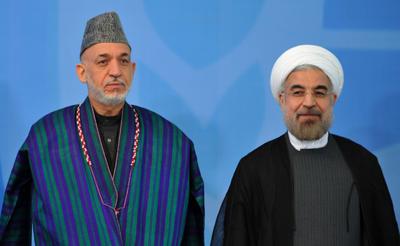At that moment, China had the status of a rising regional power, and Russia was transitioning toward capitalism, though maintaining its image as a weakened superpower. At the September 2013 SCO annual summit in Bishkek the situation had drastically changed: China has now become the second-biggest economy in the world, while Russia is finding it hard to maintain its global status. Today the SCO member states represent 60 per cent of the total area of Eurasia, with a population of more than 1.4 billion people. They comprise the second-largest global economy and some of the largest energy-rich countries. Some experts have even speculated about the formation of a Moscow–Delhi–Beijing alliance within the SCO framework. But the question remains: is the SCO a feasible framework for alternative diplomacy or is it simply the shaky alliance of contradictory powers?
The question of stability in Central Asia following the 2014 withdrawal of NATO forces from Afghanistan was raised at the summit. In addition, more promises were made of mutual cooperation in security, energy transportation and economic development. The Bishkek declaration focused for the most part on fighting terrorism and separatism, promoting respect for sovereignty, and fostering the creation of an SCO development bank. Furthermore, the recently elected Iranian leader Rouhani attended the summit, seeking support for Iran’s nuclear program. Yet the discussion of Iranian membership in the SCO was postponed again, and the continuing reluctance to accept India and Pakistan into the SCO fold demonstrates the limitations and contradictions of such an organisation.
Prior to the summit the Chinese leader Xi Jinping visited four out of the five Central Asian republics, signing numerous billion-dollar deals and cementing China’s economic interests in the region. Russia also asserted its global role by hosting the G20 summit in St Petersburg and working to resolve the Syrian crisis. However, in Bishkek both countries pursued their own interests: Russia sought to find approval for its Syrian solution, whereas China pushed for the SCO development bank and closer investment partnerships, seeking to promote and defend its energy deals. It is clear that China and Russia prefer to pursue their own interests in the SCO rather than engage in a true form of cooperation.
This clash of interests might undermine some of the important achievements of the Bishkek declaration. First, Russia is wary about the SCO development bank because it fears that China may use it to expand its political influence in Central Asia by forcing other countries to rely on its economic strength, manifested in the bank and through Chinese overseas investment. But it is evident that without Russia’s consent, an SCO development bank cannot be realised in a predominantly Russia-dominated Central Asia. Promises of economic development and investments in the SCO could therefore be hindered by the rivalry between Russia and China.
Second, to offer stability and security guarantees the SCO should have some form of military framework. The SCO’s major problem is that it lacks a permanent collective security treaty — although Chinese and Kyrgyz forces conducted joint military exercises in August this year, the SCO does not provide any autonomous security presence in Central Asia. Conversely, the Russian-led Collective Security Treaty Organisation (CSTO) remains a major security force in the region, and Russia maintains military bases in Kazakhstan, the Kyrgyz Republic and Tajikistan. Kazakhstan, the richest country in Central Asia, has also experienced some anti-Chinese protests in recent years. Between the existing CSTO and anti-Chinese sentiment in Central Asia, therefore, the prospects of cooperation with the Chinese military are seriously limited. And in the event of a real emergency, such as ethnic clashes or the influx of religious radicals, the SCO might not be able to offer a cohesive and coordinated response.
In any case, the SCO seems reluctant to openly challenge NATO or US interests in Central Asia and Eurasia, meaning its ability to offer an alternative to the West’s political solutions is highly uncertain. In future the SCO might grow to include Iran, Pakistan and India, which could lead it to facilitate discussions over the Kashmir conflict and the Iranian nuclear program. But, by including even more diverse and opposing interests such as Pakistan and India, the SCO will only further limit its capacity and inhibit its future development. If the SCO is to become a viable alternative to US dominance in global affairs, and particularly as these relate to Central Asia, it has to resolve its own contradictions. Only then can it offer a unified vision and promote shared interests.
Bakhytzhan Kurmanov is a postgraduate student at the Australian National University. He previously worked at the Ministry of Education and Science of Kazakhstan.

